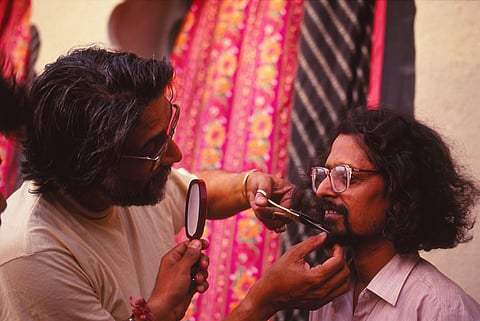When it comes to the visual arts, Muzaffur Ali has excelled in painting, fashion and film, though not necessarily in that order. Zikr, his autobiography lets the reader into the gradual unfolding of his life from his childhood to his education and his journey as a filmmaker. As the name suggests, Zikr is an expression of gratitude to those who have influenced his life, beginning with his father, the poets he met in Aligarh University and the cities where he spent time, Lucknow, Calcutta, and Mumbai. Like all creative people Muzaffar Ali spends his time picking up new details. Learning he writes is a lifelong pursuit, and the search for knowledge should ultimately lead one to "truth." This philosophy is something he picked up from the Sufi sages and which is followed throughout the pages of Zikr.
Zikr: In The Light And Shade Of Time
Like all creative people Muzaffar Ali spends his time picking up new details. Learning he writes is a lifelong pursuit, and the search for knowledge should ultimately lead one to 'truth.' This philosophy is something he picked up from the Sufi sages and which is followed throughout the pages of his autobiography 'Zikr'.
His journey can be divided into three. His formative years in Kotwara, Lucknow where he talks about his father Raja Syed Sajid Husain Ali and his unsuccessful quest to enter politics and make a statement for a free humanist India. This goes onto Ali’s studies in Aligarh – where he was sent by his father who wanted him to shake off his royal heritage and try a taste of anonymity, Muzaffur Ali was not a good student but he adored poetry and picked up many influences and friends. The poetry that adorns Zikr, from the fourth chapter onwards, provides insight into Ali's perspective and the poetry scene at AMU. This section continues with his stint in Clarion Advertising and his years with Bobby Kooka in Air India.

Gradually film enters the story – it was film that ultimately forced him to leave Air India albeit reluctantly. Ali shares the back stories of Gaman and Anjuman with readers – not to mention the mesmerising effect of Rekha’s eyes glimpsed on a magazine which led to his choosing her for Umrao Jaan. His second wife Subhasini Ali had an important role to play there with his Tamil bloodline which led to an instant connect with Rekha. There are insights into how Zooni was affected by Kashmiri insurgency and left incomplete. However that led to his association with fashion and the formation of the House of Kotwara.- since he realised that filmmaking would have constant hiccups and perhaps it was better to do something that would enhance people’s beauty and do good to the community too – something he had actually explored in Anjuman.

The book ends with Muzaffar Ali’s gratitude to the Sufi saints and poets who influence him – Rumi, Sheikh Moinuddin Chishti to whom he had a family connect, Nizamuddin Aliya and Amir Khusrau, to name a few. He now helms the Rumi Foundation in New Delhi and since 2001 has been in charge of setting up the yearly World Sufi Music Festival, Jahan-e-Khusrau,. However, his dream of making a film on Rumi has remained just that – a dream. The star system is not kind to filmmakers with stars in their eyes.
Muzaffar Ali talk about his long term relationships with colleagues and workers - the mouthwatering delicacies that his cook Tahir served, who remained with him until his death, the cobbler Bharat Waghchawre, whom he picked up on an impulse and who thereupon spent 20 years crafting exquisite shoulder bags for the Craftsmen of India brand, his graphic designer Jolly Barua, who created the artwork and posters for his films Gaman and Anjuman, and the AMU poet Shahryar, who became his go-to lyricist. Many encounters led to greater outcomes – his meeting with the designer Mary Mcfadden in New York inspired the Kotwara brand. He is open about his weaknesses like gullibility though not necessarily about his relationships with his wives. His first leaves the story in a sentence. The gullibility, he confesses led to an unsuccessful stint in politics and fell back on philosophy and the Sufi poets for consolation.
The book is a voyage through a visual world with its attendant chiaroscuro, filled with incidents and poetry.
Author: Muzaffar Ali
Publisher: Penguin Random House
Price: ₹699